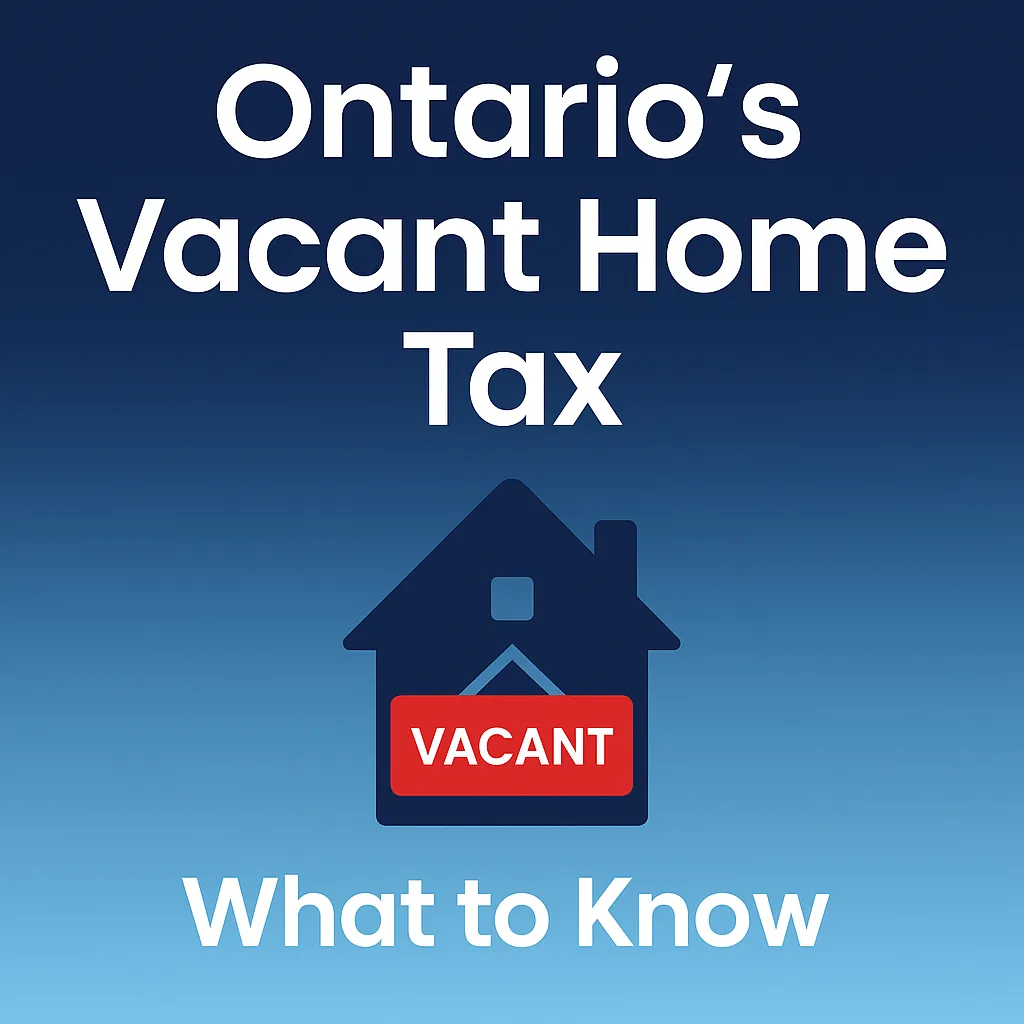Intro
Ontario municipalities are rolling out vacant home taxes to free up housing stock and address the rental crisis. As a professional realtor, it’s crucial to guide clients—especially first-time buyers, landlords, and investors—through the new rules, exemptions, and deadlines. This guide breaks it all down, including specifics for Toronto, Hamilton, Ottawa, Windsor, and Sault Ste. Marie.
Why It Matters
Vacant home taxes aim to discourage property hoarding and stimulate rental market supply. In Toronto alone, the rate jumped to 3% of assessed value in 2024, funding affordable housing programs. Across Ontario, several municipalities now charge 1–4%, making this a widespread policy shift .
Who It Matters For
- Homeowners with investment properties or second homes: Any property vacant for six months or more could trigger the tax.
- Landlords and investors: Vacancies directly impact cash flow due to extra tax burdens.
- Buyers & sellers: Closing deals can be complicated if prior declarations were missed—buyers may inherit liability.
- Those in Peel Region: The rollout is paused until the region’s dissolution on Jan 1, 2025.
Key Points & Steps
1. Declaration is Mandatory
- Toronto: Declare occupancy by April 30 annually via online, phone (311), or in-person. A late fee (~$21) may apply .
- Hamilton: Declare by April 30, extended to May 30 in 2025 as a one-time courtesy.
- Ottawa: Declare by the third Thursday in March; late until April 30 ($250 fee).
- Windsor & Sault Ste. Marie: Complaint-based; owners must self-declare if vacancy exceeds thresholds
2. Understand Tax Rates
The applicable legislation does not set out any requirements related to the tax rate for Vacant Home Taxes.
3. Check Exemptions
Typical exemptions include:
- Principal residence (occupied ≥6 months)
- Owner death, major renovations, medical care, legal orders, recent sale or purchase
- It is rented out and occupied as a residence by a tenant for at least 6 months of a taxation year.
- It was owned by a registered property owner who has died in the applicable reference year / tax year.
- It is owned by a registered property owner who is in care (for example, institutionalized or hospitalized).
- Ownership of the property was transferred in the reference year / tax year (where the year of sale or transfer is the reference year / tax year).
- It is undergoing major redevelopment or renovations that, in the judgement of the municipality, are being pursued within a reasonable timeframe.
- It is subject to a court or municipal order prohibiting occupancy and the owner has made reasonable efforts to remedy the circumstances that led to the order.
- It is a seasonal property (including properties that are classified by Municipal Property Assessment Corporation as falling under property codes 363, 364, 385, 391, 392, and 395).
- It is otherwise uninhabitable for reasons beyond the owner’s control.
- Other circumstances identified by a municipality as representing an appropriate use of a residential property (for example, a municipality may wish to exempt properties required for occupation for employment purposes).
4. Audit & Dispute
Municipalities can audit (random, tips, repeat vacancies). If deemed vacant, owners can file a complaint or appeal—Toronto gives until Dec 31, 2025 for 2022–2024, Hamilton gives 60 days.
5. Payment & Lending Impacts
- Toronto payments are in late 2025 installments, with 1.25% monthly interest on late payments.
- Mis‐declarations or non‑payment can draw fines up to $10,000.
- Buyers may inherit tax liability—ensure clear statements or tax clearance certificates before closing.
Real-Life Example
Toronto Investor’s Condo:
- Bought Feb 2024. Sold Dec 2024.
- Although vacant for two months, the sale involved legal transfer—exempt under “transfer of legal ownership.” Vendor declares & provides proof pre‐closing. The buyer confirms no liability.
FAQs
1. What if I miss the declaration deadline?
- Toronto: late fees (~$21) may apply and property becomes deemed vacant .
- Hamilton & Ottawa: fines or fees for late/missed declarations.
2. Can I appeal?
Yes. File a Notice of Complaint—Toronto until Dec 31, 2025 (for 2022–2024), Hamilton within 60 days of billing.
3. Does this affect federal UHT?
Yes—a separate Underused Housing Tax applies federally to non-resident or underused properties at 1% of assessed value.
Conclusion
Vacant home/unit taxes are here to stay across Ontario. Proactive compliance—annual declarations, keeping documentation for exemptions, knowing deadlines—is key for homeowners, investors, and realtors. Proper planning now helps avoid penalties, interest charges, or closing delays.

